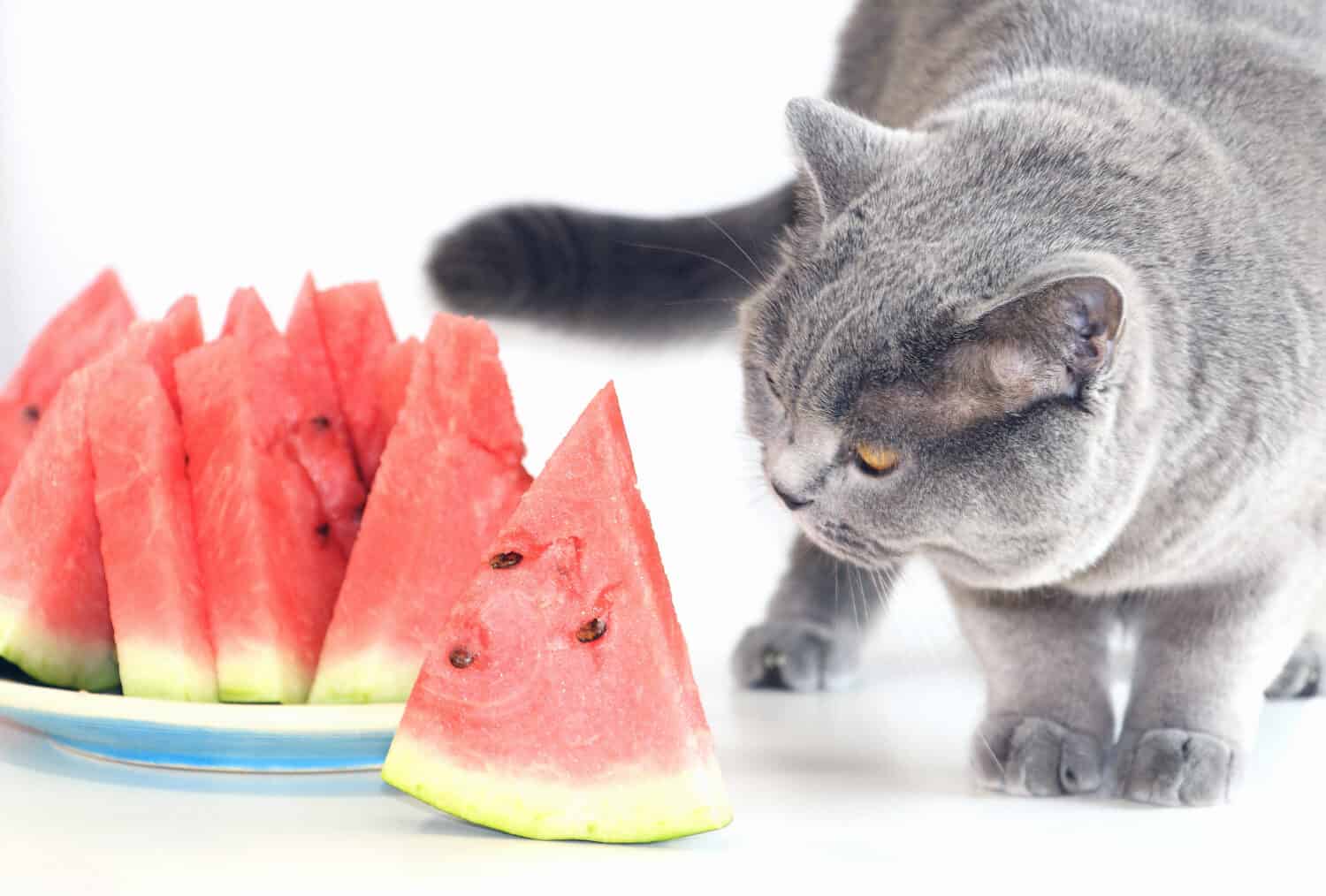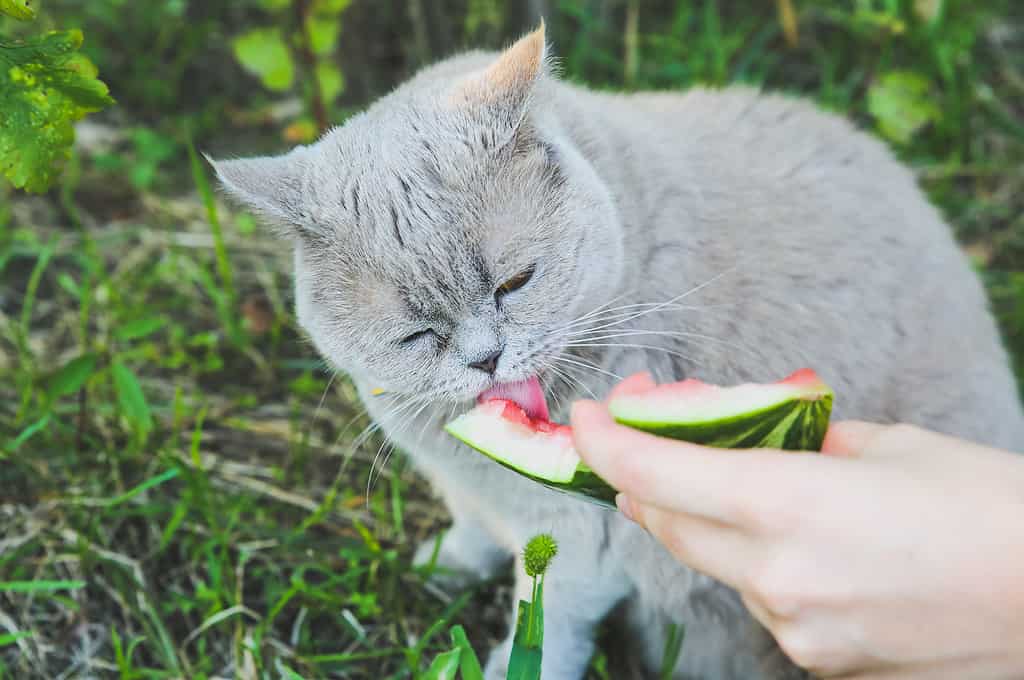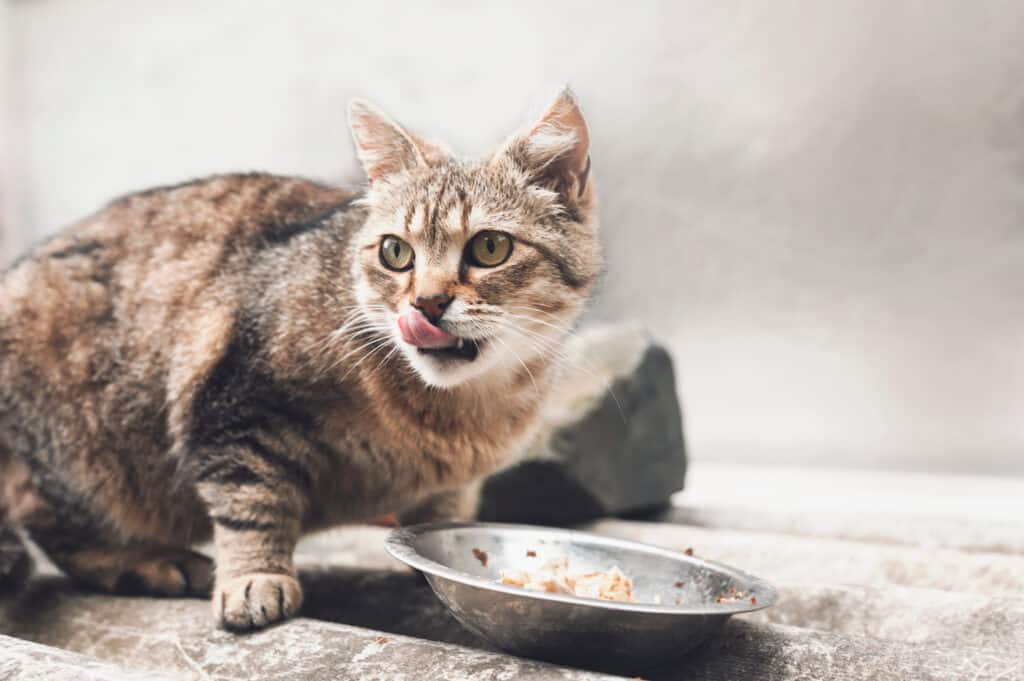Cats are enigmatic, wondrous creatures. Lively and often unpredictable, these wonderful beings have taken over our homes, hearts, and the entire internet. As any cat parent can attest, they are highly curious and are often intrigued by the most unexpected of things. One such item that piques their interest is watermelon. The image of a cat nibbling on a slice of this refreshing fruit is adorable and amusing, but is it safe for our furry friends?
In answer to our juicy and pressing question: can cats eat watermelon…the short answer is both yes and no. On the one hand, yes…most healthy cats with no major medical conditions can technically eat a little watermelon here and there. But on the other hand, no…watermelon provides no real nutritional value and can be dangerous for cats with specific health issues, like diabetes. Worse, it can even cause diabetes and/or obesity. Let’s take a closer, more intimate look at watermelon and cats.

Healthy cats can eat watermelon in moderation since it is not inherently toxic. However, you should take precautions when allowing your feline companions to bite into this juicy fruit, particularly if they are diabetic.
©Sagittarius_13/Shutterstock.com
1. Watermelon is Not Toxic to Cats
While certain citrus fruits can pose risks to feline health, watermelon stands out as a safe option for our cats. Unlike limes, lemons, oranges, clementines, and grapefruits – whose peels, fruit, stems, and leaves can all cause digestive upset and even central nervous system depression – watermelon is not inherently toxic. In contrast to common foods, plants, or household items that are poisonous to cats, watermelon will not cause gastrointestinal distress, neurological changes, or respiratory difficulties – thank goodness! On this important note, if you suspect your cat has been poisoned, call the ASPCA poison control hotline immediately at 888-426-4435. It is also great to store this number in your phone to save precious time in an emergency.
Okay, back to the topic at hand. Because it is relatively harmless, felines can eat watermelon in moderation without any problem, as experts generally consider it to be a cat-friendly fruit. Moreover, since it consists mainly of water, a few small bites can even help hydrate your feline companion on sizzling summer days. Watermelon is a super refreshing treat, especially if you cut it up and freeze it. You shouldn’t hesitate to share a tiny bit of a cold slice with your cat in scorching conditions, and don’t need to fret if they get into some pieces on the counter.
Still, there two important caveats here: 1. While watermelon is not toxic, its black or white seeds can be a choking hazard. Always remove these pesky dangers before serving any watermelon to your cat to prevent disaster. 2. Cats are individuals with varying sensitivities and dietary requirements. Always monitor your cat’s response after offering them watermelon for the first time. If you notice any signs of digestive upset, such as vomiting or diarrhea, it’s best to avoid giving them watermelon in the future.

While watermelon is not toxic, its black or white seeds can be a choking hazard. Always remove these pesky dangers before serving any watermelon to your cat.
©Only_NewPhoto/Shutterstock.com
2. Risks to Consider
Watermelon may not be on the list of foods we would call poison control over, but it is not without potential risks, especially for cats with certain health conditions. Diabetes in particular, requires that we carefully manage our cats’ diet to regulate their blood glucose levels. High in natural sugars, watermelon can cause a sudden blood sugar spike if consumed in large amounts. Furthermore, because fruit is not a natural part of any cat’s diet, watermelon in excess can even cause diabetes. It can also cause obesity. As always, it is best to consult a veterinarian before introducing watermelon–or any other new food–into your cat’s diet, particularly if they have any pre-existing conditions.
3. Watermelon Will Not Meet Your Cat’s Nutritional Needs:
Here is another important thing to understand about your cats and watermelon. No matter how refreshing, this fruit, which is incredibly good for humans, actually falls short when it comes to meeting feline nutritional needs. Cats are obligate carnivores, meaning their bodies have evolved to thrive on a diet primarily composed of animal protein. They have not evolved to eat plants the way we have. More importantly, watermelon lacks the essential nutrients, such as taurine and Vitamin A, that cats require for optimal health. Therefore, feeding watermelon regularly can cause nutritional deficiencies or imbalances in the long run.
Speaking of which, since you’re here, you are likely interested in feline nutrition. It is easy to go down a rabbit hole trying to figure out the best possible foods for your cat. Of course, nutritional needs vary depending on your cat’s size, health, activity level, and age. For instance, kittens, adult cats, and seniors have different dietary requirements. No matter what, cats need meals that have been specifically-formulated for them. So if you plan to feed your cat a homemade diet, be sure to follow recipes veterinarians have created with proper nutritional balance in mind. And no matter what, never, ever, ever feed your cat a vegan diet.
Alternative Safe Treats: If you’re looking for a suitable treat to share with your feline friend, there are plenty of other options besides watermelon. Cat-friendly snacks, are, of course, readily available in pet stores. These treats provide necessary nutrients and are a a more well-rounded choice for indulging your cat’s taste buds.

Cats are obligate carnivores, meaning their bodies have evolved to thrive on a diet primarily composed of animal protein.
©Lia Kos/Shutterstock.com
4. Cats Are “Sweet-Blind” and Cannot Taste Watermelon Like We Can
Finally, here is a super fun fact. If your cat enjoys watermelon, she is likely intrigued by its texture and feel rather than its flavor. Why? Because cats are the only animals in existence who cannot taste sugar. It’s strange but true! Scientists have uncovered evidence supporting the theory that cats are “sweet-blind” because their tongues cannot discern even a hint of sweetness whatsoever. As a human with a sweet tooth myself, I am not sure if I should be sad for cats or jealous. Imagine how much easier it would be to resist to dessert if you couldn’t even taste it?! Ha! But I digress…
By identifying the absence of sweetness receptors in cats’ taste buds, researchers have recently confirmed that cats, being obligate carnivores, have limited sensitivity to sweetness. Unlike humans and other animals, cats do not possess the necessary taste receptor genes responsible for detecting and experiencing sugary goodness. Who knew?
This intriguing finding provides valuable information about the nature of taste perception and its evolutionary roots. The ability to perceive sweet flavors likely evolved as a mechanism to identify and seek out energy-rich carbohydrates, which are abundant in fruits and other plant-based foods. However, as strict carnivores, cats have adapted to a diet primarily composed of protein and fat, rendering the ability to taste sugar unnecessary for their survival. I now understand why my cats and dogs behave so differently around cookies, cakes, and ice-cream!
If they cannot taste its sweetness, why do cats like watermelon at all? Well, it is likely the texture or perhaps even the unique scent that attacks them. With their discerning and sometimes peculiar tastes, cats are likely drawn to the novelty of watermelon. They likely enjoy interacting with it on a sensory level, which can be fun to watch.
Know Your Cat and Use Common Sense
In short, use your best judgement when feeding your cats watermelon. Pay attention to their responses and look for signs that it may not have agreed with their systems. Most cats can tolerate small amounts of watermelon without any issues, but others may not show interest or may have specific health concerns that make it less suitable for them. Either way, prioritize good nutrition to help your cats live their very best nine lives!
The photo featured at the top of this post is © Skarynka Alena/Shutterstock.com
Thank you for reading! Have some feedback for us? Contact the AZ Animals editorial team.






